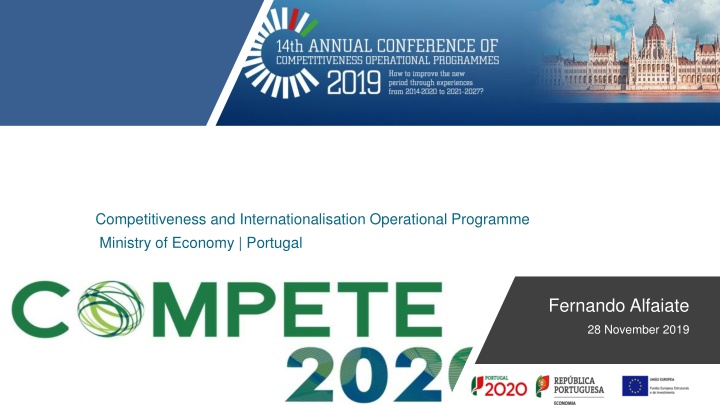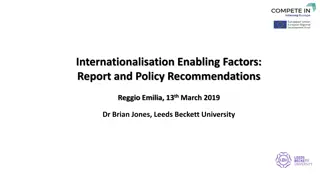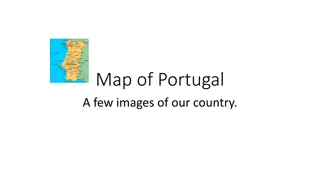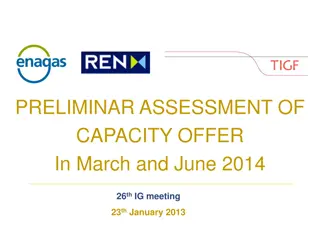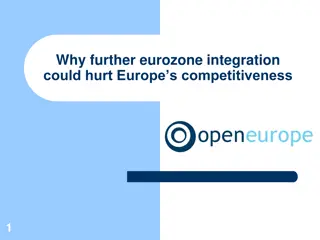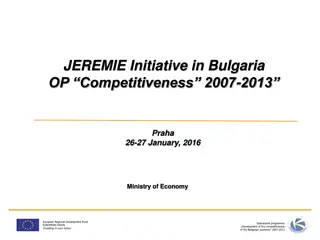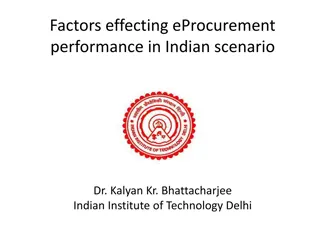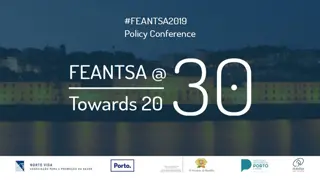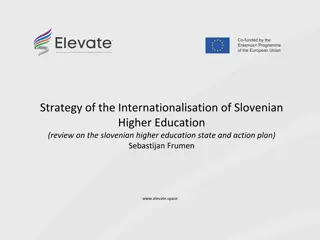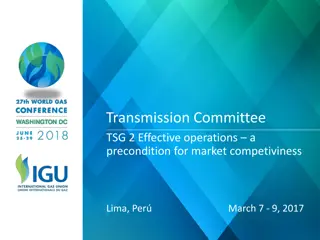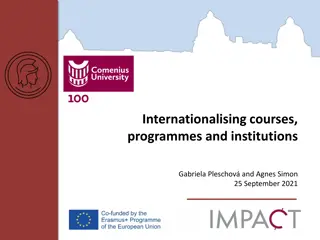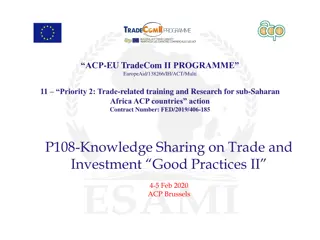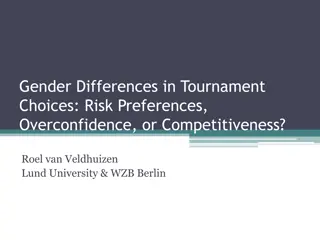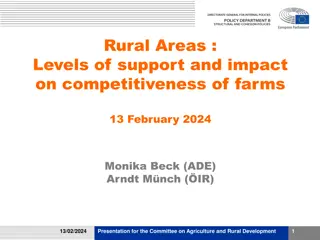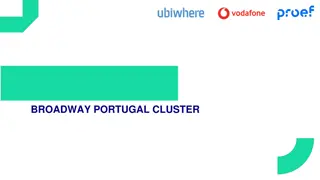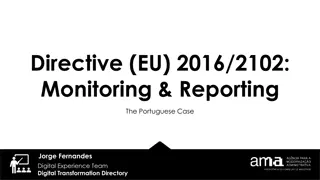Competitiveness and Internationalisation in Portugal
The Operational Programme by the Ministry of Economy in Portugal focuses on improving competitiveness, internationalisation, job creation, and wealth generation for enterprises. It includes various policy instruments, audit topics, and planning for 2021-2027. The Programme's main objective is to enhance enterprise competitiveness and internationalisation, leading to economic growth and well-being. Key areas of focus include research, innovation, SME competitiveness, sustainable transport, employment, and public administration. The Programme's budget, thematic objectives, and achievements in supporting firms, R&D, and start-ups are also outlined, showcasing impressive impacts on productivity and economic growth.
Download Presentation

Please find below an Image/Link to download the presentation.
The content on the website is provided AS IS for your information and personal use only. It may not be sold, licensed, or shared on other websites without obtaining consent from the author.If you encounter any issues during the download, it is possible that the publisher has removed the file from their server.
You are allowed to download the files provided on this website for personal or commercial use, subject to the condition that they are used lawfully. All files are the property of their respective owners.
The content on the website is provided AS IS for your information and personal use only. It may not be sold, licensed, or shared on other websites without obtaining consent from the author.
E N D
Presentation Transcript
Competitiveness and Internationalisation Operational Programme Ministry of Economy | Portugal Fernando Alfaiate 28 November 2019
Main Topics 1 - Brief status of the implementation 2 - Experience of new policy instruments 3 - Remarkable audit topics 4 - Assessment of the effectiveness of FI 5 - Status of planning 2021-2027
1 - Brief status of the implementation
Main Objective Improving the competitiveness of enterprises and their internationalisation, creating jobs and generating wealth and well-being
Programme Programme Budget for Budget for 2014 2014- -2020 3.403 M -> 54% ERDF Fundo ESI Funds 609 M ->10% CF 69 % 4.414 M 2020 ESF 402 M -> 6% P 1.615 M -> 25% Private Nacional Cofinancing Public P 312 M -> 5% 1.927 M 31% Total Budget 6.361 M
4%4% 13% TO1 - Research and innovation 36% Thematic Objectives TO2 - Information and communication technologies TO3 - SMEs competitiveness TO7 - Promotion of Sustainable Transport TO8 - Employment and labour market TO11 - Better public administration 2% 41%
49% Total COMPETE 2020 109% 100% 30% Technical Assistance 64% 100% 23% Efficient Public Administration 69% 100% 29% Sustainable & Quality Employment Financial Implementation 135% 100% 25% Network Infrastructures in Transport 81% 100% 48% Research & Innovation 108% 100% 65% Competitiviness of SME s 124% 100% 0% 20% 40% 60% 80% 100% 120% 140% Spent Decided Planned
FIRMS: Grant aided Decided: 4.250 Projects R&D Decided: 2.250 Achievements: Numbers and figures Start-up Decided: 500 FIRMS: New direct jobs Decided: 14.564
Achievements: Impact Productivity Supported enterprises: 61% increase total turnover 87% increase Gross Value Added 78% increase Exports Volume 33% Direct employment increase
2 - Experience of new policy instruments
1. It is the most important incentive system in support of innovation and productive investment and with the greatest impact on the productive specialization profile, smarter and with greater added value New SME New SME Support Support Tool Tool 2. Necessary to maintain the dynamics of support for business investment, emphasising in the analysis not only criteria of merit but also criteria of financial analysis and risk 3. Necessary as a solution to face the shortage of funds: o Higher leverage effect o Ensure the capacity to finance SME projects
Blended support combination New SME New SME Support Support Tool Tool Grant + Financial Instrument (under Article 37(8) CPR)
New SME New SME Support Support Tool Tool Aplication 1.000 k Example: Investment 1M - Small company Base Rate 40% Bonus 10% (Sectorial Policies Industry 4.0) Co - financing 1.000*50% = 500 k Total confinancing rate 50% Total 500k Operation A Grant Operation B FI garantee Grant 250k (50%) Financial Instrument 250k (50%) Eligible Expenditures 750 k Eligible Expenditures 250 k Grant 250 K Private contribution 500 k Eligible Expenditures FI 250k Garantee 80% interest rate subsidies and guarantee fees Eligible Expenditures Grant 1M - 250k = 750k
New SME New SME Support Support Tool Tool Analysis and decision circuit Intermediate Body Banks + Mutal garantee IFD Application Single Investment Same Platform Managing Authority Analysis Decision Form Single investment: 2 operations: INR and IF, Autonomy but interdependence IB: Access and eligibility of the investment project to the SI Innovation Company submits application The company indicates in the application (max 2) the banks MA: Approves Operation grant , under the terms of SI Innovation; Banks; Company risk analysis; The application sent to IB, Banks and MGS MGS: Evaluation grant guarantee IFD: approval process IF operation
New priority New priority dimensions dimensions ( (new paradigms) Objective: promoting innovative and smart economic transformation Selectivity based on new priority dimensions (new paradigms): digitization industrial transition circular economy energy transition
3 - Remarkable audit topics
Definition of SME SME Certification Electronic certification service IAPMEI - national agency, ministry of economy https://www.iapmei.pt/Paginas/certificacao-PME.aspx
4 - Assessment of the effectiveness of Financial Instruments
SME Financial Instruments in Portugal Delays in establishing Financial Instruments (2015 2016) First operations approval: Equity - December 2016 Debt/guarantee - September 2016 Other available financial instruments competing with FIs financed by ESI Funds: BEI; IF with national funds PT
SME Financial Instruments in Portugal Managing Authorities Funding agreement IFD - managing entity fund of funds manages DEBT & GUARANTEE Equity Holding Funds bonifications/ loans Participation guarantee Venture Capital Funds Business Angels Other Capital FI Guarantee System Financial Institutions guarantee SME
SME Financial Instruments in Portugal SME Financial Instruments in Portugal Results by end of October Equity Debt/guarantee 2.500 loans/guarantees approved 338 Projects Investments approved 1.000 M Investments 180 M Investments 1.800 jobs to create 4.500 jobs to create
5 - Status of planning 2021- 2027
Concerns Concerns Achieve a good closure of the total implementation Smoothly transition Still have many tasks ahead No repayable assistance Limitations of access by large companies to EFI funds
Evaluation of supporting to firms and lessons learnt Relevance and Coherence Coherent diversity of instruments to support competiveness of Portuguese firms. Well fitted for supporting the needs of different firms (size, sector, innovation stages, etc.) Maturity of the set of instruments with an evolutionary (not revolutionary) approach over the programming cycles Good reply to market failures in innovation systems (e.g. complementary and promoting sequential processes) Some areas where there is room for improvement: - Better articulation among cluster policy and RIS3; - How to ensure a better and timely support to the transition stage from R&D to innovation (e.g. proof of concept); - More efficient and effective solution to promote professional training for employees (within productive framework), taking into account the specificities of Portuguese framework (mainly small firms and a strong system to support professional training through education and training centres); Some concern on the alignment between ERDF rules and European State aids framework
Evaluation of supporting to firms and lessons learnt Operational efficiency Need to keep a high degree of selectivity Operational model is globally appropriated to the Portuguese needs and is well known and positively recognized by the stakeholders The best practice of Network way of working among Managing Authorities and Intermediate Bodies (e.g. harmonization and capacity building)
Evaluation of supporting to firms and lessons learnt Operational efficiency Some areas where there is room for improvement: - The real capacity to process such a high level of applications (e.g. the difficult to comply with the approval and payments deadlines); - The role of simpler instruments (e.g. vales and FI) and the need for a continuous approach on simplification of processes ( allowing more time for projects monitoring on a preventive approach) - A stronger articulation across the instruments (e.g. simpler sequential approach on innovation process or between tools for collective and individual support); - How to implement a simpler funding mechanism for integrated projects of firms within the context of complex financial management (Fund, priority axis, thematic objective, investment priority...); - The need for increase the territorial fitting of instruments, notably an increase in the use of devoted calls (e.g. RIS 3) - The continuous search for a better balance in the trade off equity/specificities.
Evaluation of supporting to firms and lessons learnt Effectiveness Relevant positive impact on the performance of the supported firms (e.g. investment, innovation, human resources qualification, added value counterfactual evaluation) and on Portuguese Economy Relevant positive impacts estimated for supported projects under PT 2020 (under development) Some areas where there is room improvement: - The role on promoting economic performance of low density areas how to find the more efficient and effective way of positive discrimination and to promote a more integrated offer of policy instruments that area critical for this types of territories (e.g. PROVERE, RIS3); - Possible fine-tuning of selection criteria and aid intensity, notably according to the financial situation of firms.
Competitiveness and Internationalisation Operational Programme Ministry of Economy | Portugal Fernando Alfaiate 28 November 2019
